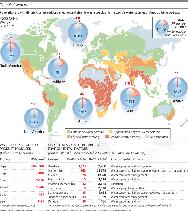 UN warns of widespread water shortagesMar 12, 2009 - Martin Mittelstaedt - Globe and Mail Constantly rising demand for a finite resource raises risk of political upheaval and economic stagnation over next 20 years, report says ENVIRONMENT REPORTER The world faces a bleak future over its dwindling water supplies, with pollution, climate change and rapidly growing populations raising the possibility of widespread shortages, a new report compiled by 24 agencies of the United Nations says. The warning from the UN is based on one of the most comprehensive assessments the global body has undertaken on the state of the world's fresh water and was commissioned for use at a major international water conference being held next week in Istanbul. "Today, water management crises are developing
in most of the world," the report says, citing
a single week in November of 2006 when there were
local news reports of shortages in 14 countries,
including parts of Canada, the United States and
Australia.
The assessment, called World Water Development Report, says that while water supplies are under threat, the demand for water is increasing rapidly because of industrialization, rising living standards and changing diets that include more foods, such as meat, that require larger amounts of water to produce. "The result is a continuously increasing demand for finite water resources for which there are no substitutes," it says, predicting that by 2030, nearly half of the world's population will be living in areas of high water stress. The UN is worried that squabbles over water in politically unstable areas are increasingly driving conflicts, requiring the development of new security strategies to resolve these disputes. It says the water woes could increase the risk of national and international security threats, pointing to a number of countries that could be vulnerable to conflicts over water resources, including Israel and the occupied Palestinian territories, Haiti, Sri Lanka and Colombia, among others. The report also warns that water shortages are having another unusual effect: They are beginning to constrain economic growth. The report cites a lack of water as a threat to growth in parts of China, India and Indonesia, and commercial centres in Australia and the western United States. "We have an increasing level of scarcity in a lot of countries," observed Zafar Adeel, the Hamilton, Ont.-based director of the United Nations University's international network on water, who worked on the report. Population and urban growth are among the reasons the UN agencies worry about water shortages. Every year, the world's population grows by another 80 million, with most of the growth occurring in urban areas. The report says this means the world will have "substantially more people" living in urban and coastal areas vulnerable to scare water resources. Another concern is the huge demand agriculture places on water resources. Already, about 70 per cent of the fresh water used by people is for growing crops and raising livestock. The report expresses concern that as more people in emerging economies gain middle-class lifestyles, they will consume more milk, eggs, chicken and beef, "which is much more water-intensive than the simpler diets they are replacing." The report says that within the next 30 to 50 years, there will be "substantial population displacements" due to global warming, and that those affected, whom it terms "climate-change refugees," will need new water and sanitation services. Another problem is the lack of safe water and sewage disposal. The report estimates that almost 10 per cent of the world's disease could be prevented with clean water. |
Email this page to a friend
If you speak another language fluently and you liked this page, make
a contribution by translating
it! For additional translations check out FreeTranslation.com
(Voor vertaling van Engels tot Nederlands)
(For oversettelse fra Engelsk til Norsk)
(Для дополнительных
переводов проверяют
FreeTranslation.com )


